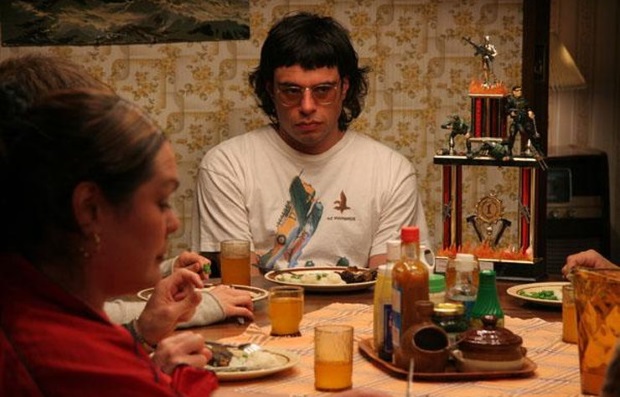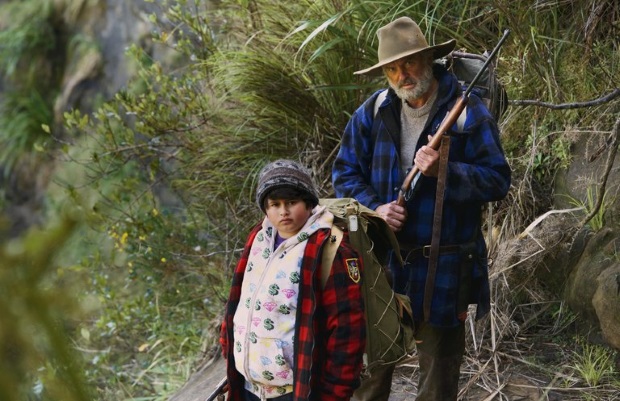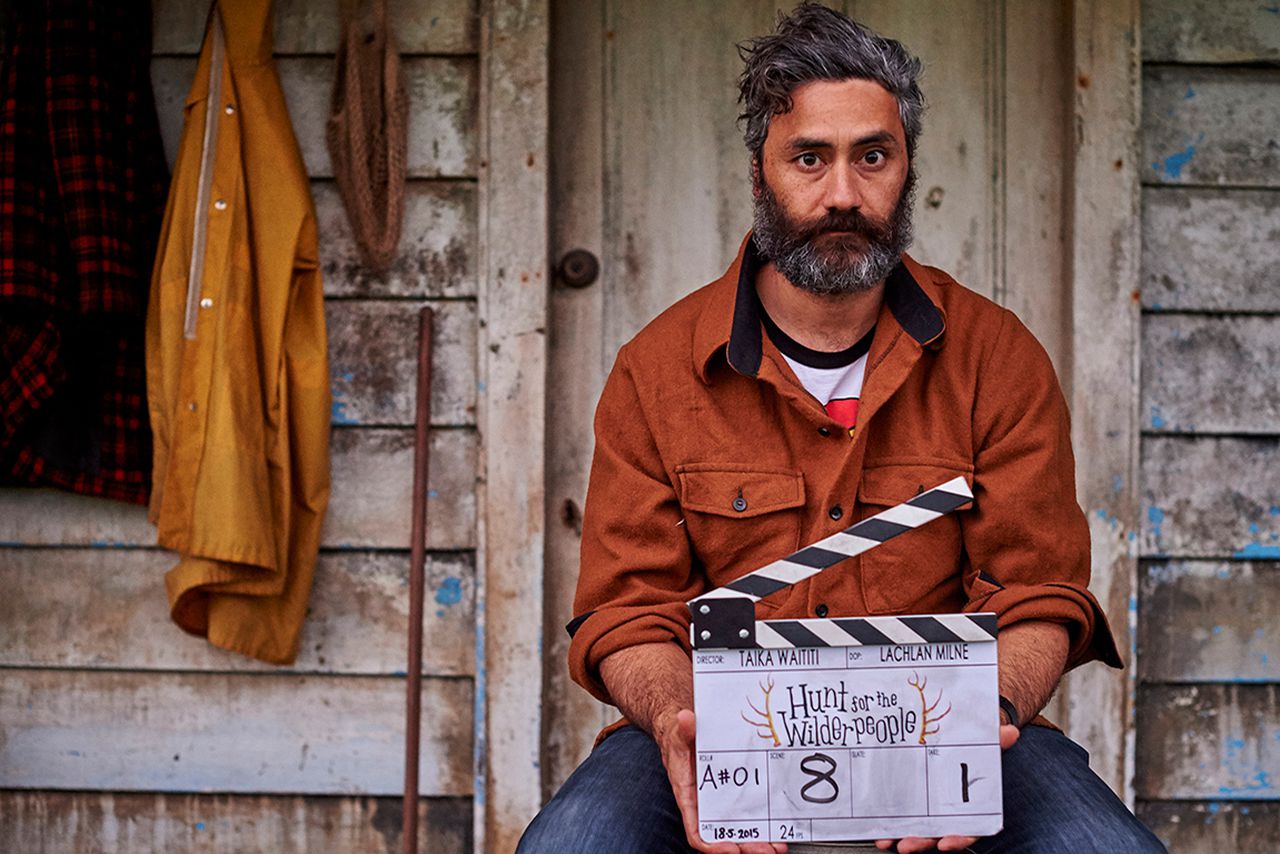A minor spoiler for Hunt For The Wilderpeople lies ahead (but it’s something that happens very early in the film!)
After a troubled production, the second Thor film was regarded as one of Marvel Studios’ lesser movies. The character of Thor was not a big part of the Avengers movies either, and so the prospect of a third Thor film was not keenly anticipated. Then, about two years ago, Taika Waititi was announced as director, and suddenly people got excited.
This is not because Waititi was in Green Lantern, and people who were involved in that seem to try really hard to make a good superhero film, but because Waititi’s movies have been critically acclaimed across the world, and have broken box office records in his home country of New Zealand.
Waititi (sometimes credited as Taika Cohen, using his mother’s surname) met future collaborators at Victoria University as a drama student, being part of the comedy troupe So You’re A Man with David Lawrence, Carey Smith, Bret McKenzie and Jemaine Clement. Waititi and Clement later formed The Humourbeasts. Both were successful across Australasia, and the latter toured across the world. Waititi later directed and wrote episodes of Flight Of The Conchords, and played their manager in an earlier sketch before Rhys Darby took on the role.
With all this experience behind him, Waititi moved from directing comedy shorts to being Oscar nominated for his film Two Cars, One Night – aspects of which would also appear in his second film Boy. Boy was developed at the Sundance Writers’ Lab project in 2005, alongside other writers including David Benioff of Game Of Thrones fame. Waititi developed the script over three years, and in the meantime made his first feature length film: 2007’s Eagle Vs Shark.

One thing that becomes clear after watching all of Waititi’s films is that he regularly returns to favourite themes with a recurring set of collaborators and performers. His work with Jemaine Clement tries to do new things to the comedy manchild trope, and his films explore damaged families and awkward relationships between fathers and sons. Waititi also paints (which, as Eric Roberts noted in The Expendables, is ‘how it starts’) and his work has maintained a lo-fi handmade aesthetic, incorporating animated and illustrated segues between scenes. Even with these trappings of whimsical comedies (also including acoustic guitar driven soundtracks, flights of fantasy and ambient, downbeat comedy) they’re grounded in strong outcast characters and mundane realities.
Eagle Vs Shark received negative comparisons to Napoleon Dynamite upon release, but it isn’t as light as that film. There are likeable losers in both, but in Waititi’s films they’re being ground down by a cruel world that doesn’t want them. Even within groups of outcasts, they are let down by people close to them, people they thought were giving them an exciting new lease of life, and serious mistakes ensue. Waititi really knows how to land the second act downer, straddling the thin division between comedy and tragedy.
Even Eagle Vs Shark manages this despite featuring, in Jermaine Clement’s Jarrod, an attempt to push the manchild character to an extreme. Jarrod is still emotionally a teenager at the age of 28, and he’s hard to like. Then you see his family situation and you understand, even sympathise. There’s a tragedy behind the initially funny behaviour that’s fleshed out, but still leaves the viewer with gaps to fill. When the time comes for Jarrod to prove to everyone he’s a better man and that he’s learned something, the ensuing scene is nothing like Napoleon dancing at the class president elections. It goes from triumphant to painful. You’re not sure whether to laugh or cry.

This kind of tonal shift or jar is another feature of his work. When Bella suddenly dies in Hunt For The Wilderpeople we see Hec wailing over her body from Ricky’s point of view, and all the joy seems to be gone from the film, but then it immediately moves onto a eulogy delivered by Waititi himself, playing a minister who has badly misjudged the amount of solemnity and audience interaction a funeral deserves. What We Do In The Shadows mines a lot of comedy from the clash of loveable idiots who happen to be vampires, such as when Viago awkwardly and clumsily brings a woman back to the flat to drain her blood. In that film there are occasional lurches into horror, and Waititi’s control of dynamic contrast is excellent. When violence or pathos arrives it does so with an impact, stark against the lo-fi comedy.
Another regular theme Waititi’s films depict is fragile and sometimes toxic masculinity, especially within difficult father/son relationships. What We Do In The Shadows is the tale of men, alone together, trying to come to terms with the world. While Eagle Vs Shark came from Loren Horsley’s character idea, and follows Lily throughout the film, Jarrod gets more of a story, with his character defined by his male relatives, with he and his brother struggling to live up to their Dad’s hopes for them. Boy and Hunt For The Wilderpeople follow a son and a father figure through a difficult period of their lives. Their relationships are complicated, lies are told, trust is an issue.

Finally, location is a key aspect of all of Waititi’s films so far. Boy was filmed where he grew up, Eagle Vs Shark contrasts the isolation of the city with the expanse of the coast. What We Do In The Shadows uses suburbia to great effect, and Hunt For The Wilderpeople is enhanced by its majestical (Shakespeare used it, it’s a word) location filming. These films are of New Zealand, with cultural touchstones that only New Zealanders will understand.
His success as a filmmaker has led to his involvement in Moana and Thor (plus being linked to Akira) and his next project is being financed by Netflix: Bubbles is a stop motion film about Michael Jackson from the point of view of his pet chimp. So, despite leaving those acts behind, the names So You’re A Man and The Humourbeasts remain important themes in the director’s work.

